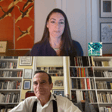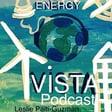Become a Creator today!Start creating today - Share your story with the world!
Start for free
00:00:00
00:00:01

Leslie Chats with Nicola de Blasio on Blockchain and Energy Systems, Trading & Hydrogen
In this episode of Energy Vista, Leslie Palti-Guzman speaks with Nicola De Blasio, Senior Fellow at Harvard’s Belfer Center, about the transformative potential of #blockchain #technology in #energy systems. They explore how blockchain can improve energy #trading, certify low-carbon commodities like #hydrogen, and enable #decentralized energy access. Nicola also discusses the challenges to adoption — from regulation to misconceptions — and why collaboration across industry, government, and innovators is key to unlocking blockchain’s promise. Education is also critical for adoption of this new technology.
Recorded on April 25, 2025.
Transcript
Introduction to Podcast and Guest
00:00:07
lpaltiguzman
Welcome to Energy Vista, a podcast on energy issues, personal and professional trajectories. I'm your host, so Leslie Pelti-Guzman. It's April 25, 2025, and time a new Energy Vista episode.
00:00:24
lpaltiguzman
Today, I'm exchanging with Nicolas de Blasio, an innovator and strategist passionate about low carbon transition and hydrogen. Nicolas is also at Harvard School of Engineering and a senior fellow at the Belfer Center.
00:00:41
lpaltiguzman
Hi, Nicolas.
00:00:42
Nicola
Hi Leslie, it's a pleasure to see you.
00:00:45
lpaltiguzman
So i'm very happy and delighted to have
Blockchain and Energy Systems
00:00:48
lpaltiguzman
you on. And we're going to talk about a promising topic, which is the intersection of blockchain technology and energy systems.
00:00:57
lpaltiguzman
And i I must tell you that it's a topic very dear um to my heart because back in March, 2018, there was actually a New York Energy Forum ah discussion on this topic of energy trading and blockchain.
00:00:57
Nicola
Yes.
00:01:15
lpaltiguzman
And for the first time, I had brought my husband with me, who an engineer, computer scientist, and had never shown any interest on energy issues ever. But because this topic was kind of at the intersection of our two worlds, this is when we realized that our two expertise were colliding. And this is about the same time we started our ah company, Energy Vista, and then we built our platform, predictive platform, Leviathan.
00:01:42
lpaltiguzman
We ended up not doing anything with blockchain. We use other technologies like machine learning and and other data sets. ah But blockchain was definitely on my radar, but I had not actually it's seen much happening recently. And so I'm very happy to have you on to tell us a little bit about the latest discussions around the use of this technology for energy in trading, in payments, um and so on.
Understanding Blockchain vs Cryptocurrency
00:02:12
lpaltiguzman
So what is the first thing that comes to me when I hear blockchain is cryptocurrency, Bitcoin, and so on.
00:02:20
lpaltiguzman
um It's also ah transparency and decentralization. So tell me a little bit, like how do you see it applied to energy markets?
00:02:33
lpaltiguzman
and And where are we right now in the um incorporation of this new technology?
00:02:42
Nicola
So let me start the with the first part of ah of ah of your question. and One of the challenges of ah blockchain technologies, i use the plural because there are more than one blockchain,
00:02:57
Nicola
everyone with its pros and cons, is that people, as you mentioned, tend to conflate the blockchain with cryptocurrencies. And they're totally totally different things.
00:03:08
Nicola
the The blockchain is the underlying technology that allows ah cryptocurrency to exist. It's just an application of the blockchain. It's not the blockchain itself.
00:03:19
Nicola
And because of this, ah it's always very difficult to to have a conversation, especially with publicly traded companies or entities about blockchain, because ah immediately they think about Bitcoin and they don't want to touch it.
00:03:35
Nicola
um From my perspective, when I come ah to blockchain on the other side of the equation from you, I always done energy and then I started to talk with a colleague of mine at MIT, who's an expert in blockchain, and we started to discuss with our students out to we could integrate blockchain and energy.
Benefits of Blockchain in Energy Markets
00:03:57
Nicola
um The value that I see in for blockchain in energy is the fact that in that world ah in an energy world, it's becoming more decarbonized, decentralized, and digitalized.
00:04:11
Nicola
The ability to basically tokenize um assets or commodities, ah certify these commodities, and follow them along value chains from production to consumption is going to be key.
00:04:27
Nicola
creating trust, ah immutable ledgers is going to be important. Think about the how trading of commodities done today. It's done through certificate of origin. It's a huge amount of paperwork that you have to provide to the exporting nation and to the importing nation.
00:04:44
Nicola
And and that the back office amount of work, ah it's crazy.
00:04:50
lpaltiguzman
So, so, so yeah, would it eliminate the traders?
00:04:51
Nicola
crazy
00:04:55
lpaltiguzman
Like, would it mean eliminate the middleman?
00:05:00
Nicola
a let's see let's say Let me put it this way. It would reduce ah significantly the need for a back office. ah With blockchain, you can you can use a what what are called smart contracts. There a code on the chain that is automatically executed when certain parameters, predetermined parameters are met.
00:05:21
Nicola
and um And so, yes, a lot of the work that the is done in trading ah for commodities could be avoided.
00:05:35
lpaltiguzman
So you mentioned trust, um and I mentioned transparency. So basically all the players interested in this kind of new way to exchange energy would be able to connect to a platform, right?
00:05:48
lpaltiguzman
To ah the same platform.
00:05:51
Nicola
ah No, because ah as I said, yes and no, sorry, because it's a little more complicated.
00:05:53
lpaltiguzman
Okay.
00:05:59
Nicola
and Because there are many different blockchains, interoperability will become key. But the point is that you need to think about blockchain as a sort of digital notebook that can be shared and updated by many people simultaneously, but because ah it's decentralized, it's also secure and transparent ah to to to everyone.
00:06:23
Nicola
Even if ah you can decide to keep some of the information proprietary, you have a lot of the information that can be shared. And because ah it's decentralized, once it's on chain,
00:06:35
Nicola
one of the value proposition of blockchain is that it's immutable and so you can you can have transparency.
Certifying Hydrogen's Carbon Intensity
00:06:43
Nicola
But let me give you an example of why I think that it could make a difference. so
00:06:48
lpaltiguzman
Thank you.
00:06:50
Nicola
As you know, around the energy world, there is a lot of talk about hydrogen. It's not the first time, ah but the situation right now is is different from the hype that we've seen in 2000.
00:07:02
Nicola
But the once you produce a hydrogen molecule, which you can produce in many different ways, the molecule is the same. The difference is the carbon intensity associated with that molecule and the cost to produce that molecule.
00:07:16
lpaltiguzman
depending if we produce it via renewable or nuclear or natural gas or coal.
00:07:20
Nicola
Yes.
00:07:23
Nicola
Yes. So basically there is a rainbow of colors. You have ah green hydrogen, hydrogen produced from renewables ah but by water splitting, which has a zero carbon intensity.
00:07:34
Nicola
And then at the other end of the spectrum, you have but ah black hydrogen, hydrogen produced from coal gasification, which has a carbon intensity of 20 kilograms of CO2 emitted per kilogram of ah hydrogen produced.
00:07:47
Nicola
And as you can imagine in a world aware decarboization is big energy world where the carbonization is becoming more and more important, being able to assign a specific carbon intensity to a molecule is going to be key, especially now that the countries ah and blocks like the European come community are are having incentives ah to incentivize ah the production of ah green hydrogen compared to the to black.
00:08:19
lpaltiguzman
Yeah.
00:08:22
Nicola
In the US, it's about carbon intensities. The the IRA was was assigning a was providing an incentive that could go few dollars depending on the carbon intensity but so how do you certify the specific molecule or if not a molecule a specific ah finite amount as a certain and
00:08:43
lpaltiguzman
So it would help with it will help with tracking those molecules with their green content content and certification.
00:08:46
Nicola
yes
00:08:50
Nicola
Yes, so you certify it, you put it on chain, and then you track the molecule from where you produce it to where you use it. Ideally, you can imagine once you take it off the chain because you have used it, you could actually issue a carbon credit.
00:09:04
Nicola
But once it's on chain, you would avoid all all the issues that you have with carbon credits, the risk of double counting and and not clarity of of where it comes ah and where it goes.
00:09:15
lpaltiguzman
Yeah.
00:09:16
Nicola
ah But also we'll simplify it.
00:09:17
lpaltiguzman
so So who is going to be interested in um putting all those information on the platform?
00:09:25
Nicola
Well, governments ah as government's the have to provide the incentives. they They need to be sure that these incentives are provided to the to the right producer.
00:09:36
Nicola
ah But based think I think all stakeholders would have an advantage. Imagine, ah for example, insurance companies. ah ah And let's think about carbon capture and sequestration. You capture this the CO2 and then you store it.
00:09:55
Nicola
You need to store it, let's say, in an empty gas or oil field.
Blockchain in Commodity Tracking
00:10:01
Nicola
If you want to do this at scale, you need to insure this this project. that How are you going to insure it?
00:10:09
Nicola
An insurer will want to know how much CO2 is in there, where it comes from. So the ability of certifying and tracking molecules, emissions, or commodities is going to to be key.
00:10:23
Nicola
and Another example that you could think of, ah think in the case of lithium. And I'm not going into the tariffs. ah discussion but you know depending of where the lithium comes and is refined are different tariffs ah so the ability to say to say that the lithium comes from argentina and is refined by a specific company and implies what kind of tariffs ah you will have ah so
00:10:50
lpaltiguzman
Yeah.
00:10:51
Nicola
ah it the The ability to tokenize, certify and put on chain ah commodities is going to be key in a world that is becoming more decarbonized and decentralized.
00:10:58
lpaltiguzman
Yeah.
00:11:03
lpaltiguzman
Yeah.
00:11:06
lpaltiguzman
Will you be able, like, let's say for gas molecules to differentiate, let's say from the gas that is produced from shell gas versus conventional gas or the methane contents of the gas molecule.
00:11:20
Nicola
Yes. As long as you can measure it, you can put it on the chain and then you can you can track it. And so and various companies have actually studied putting their gas fields on on chain and and have studied how to do the transactions internally.
00:11:42
lpaltiguzman
Very interesting. So to your um opinion, what is the most likely commodity that we'll see first on the blockchain technologies?
00:11:54
Nicola
So until January, would have said I had no doubt that it was going to be hydrogen because ah there was a practical need. The moment that the IRA assigned different incentive as a function of the carbon intensity of the molecule and all the projects that were starting, there would have been a need to be able to certify and track these molecules.
00:12:18
Nicola
and
00:12:19
lpaltiguzman
But you're talking mostly about the US markets, but my understanding that it could be global.
00:12:20
Nicola
Today,
00:12:23
Nicola
also the European.
00:12:24
lpaltiguzman
Yeah.
00:12:25
Nicola
Yes. Yes. But imagine, ah you know, you want to ship Grima Monias from Saudi Arabia to Japan and you want to certify that. The concept is the same. So the idea is that you create ah a virtual twin ah of your value chain on a blockchain.
00:12:43
lpaltiguzman
So, yeah.
00:12:43
Nicola
I mean, we discussed about...
00:12:47
Nicola
tokenizing the tortoise in the Galapagos. Like the WWF basically allows you to adopt ah an elephant. We were thinking to do the same in in the Galapagos.
00:12:59
lpaltiguzman
Wow, very interesting.
00:13:00
Nicola
ah You can also imagine in a situation where, let's say, You need to finance a your project. You could also imagine that you you tokenize ah the future ah as the future production of an asset. So you have an oil field. You could tokenize the oil field production and sell it.
00:13:18
Nicola
And then you in the future, then you would have a return.
The Future of Hydrogen in Energy Markets
00:13:23
lpaltiguzman
So do you you think that the hydrogen is completely off the table, or do you see some prospects down the road. I know you've been focusing a lot on hydrogen in your research and and i and applications.
00:13:33
Nicola
It's not even a choice.
00:13:36
lpaltiguzman
Yeah, yeah. um I mean, it's clearly this U.S. administration may put less emphasis on hydrogen, but it doesn't mean that in the medium term it will not gain again interest or other countries may take the lead on.
00:13:51
lpaltiguzman
like How do you see hydrogen right now?
00:13:56
Nicola
so I think
00:13:56
lpaltiguzman
Fair English. yeah
00:13:59
Nicola
I think that the the value proposition of ah hydrogen with all the challenges of creating hydrogen market at scale is still there. Today, we're talking about hydrogen because of a failure of the past.
00:14:15
Nicola
In 2000, there was another moment of hype about hydrogen. It was ah basically being considered for mobility application, especially in light duty.
00:14:24
lpaltiguzman
Hmm.
00:14:25
Nicola
And it faded away for two reasons. The first one was that In the light-duty segment of transportation, ah EVs, ah batteries, lithium batteries were so much farther down the innovation and learning cycles that governments were moving incentives from the batteries themselves ah to actually the building the infrastructure.
00:14:46
Nicola
And the second one was that in 2000, the cost of renewables was so much higher than today. and the And so when people say hydrogen, green hydrogen is expensive, so were renewables.
00:15:00
Nicola
But today we're talking about hydrogen because of the success of renewables. day In 2000, a lot of people kept saying they're going to be just going to be too expensive. So as you know, ah cost the of production of renewables has ah significantly dropped.
00:15:16
Nicola
This has created the a situation in which the penetration of renewable in the grid started to increase. ah A grid that was not built to deal with intermittency because, as you know, renewables are intermittent.
00:15:24
lpaltiguzman
you
00:15:29
Nicola
And so now today we're talking about hydrogen because ah there is the need to store this excess energy when um you cannot feed it to the grid. And at the same time, once you have produced the hydrogen, the dynamics are going to be exactly the same as natural gas, which we're very much used to.
00:15:50
Nicola
They're not going to be the dynamics of of renewable. So hydrogen can help to decarbonize a lot of sectors, especially hard to abate sectors. Think about steel production, cement, heavy duty tracking, shipping.
00:16:05
Nicola
It won't be probably hydrogen. It will be ammonia, but ammonia is produced from hydrogen. So I think that androgen is the value proposition is still there, ah but regardless of hydrogen, I think that the the value proposition of blockchain is that you can use blockchain and basically certify and track molecules.
Democratizing Energy Access
00:16:27
Nicola
There is another application that I particularly like, but I'll stop here in the...
00:16:33
lpaltiguzman
Yeah, yeah, no, I'm very curious to see. So you mentioned hydrogen as an application for the commodity to use blockchain. What else? Another commodity or?
00:16:43
Nicola
it's ah it's ah So when we look at the blockchain ah application in energy, we basically rank them on the basis of different parameters in short term, long term, medium term long term. Hydrogen is is for us, it's ah it's in the short term.
00:16:58
Nicola
what i think it's the second application that could be game-changing is what i call the energy for all ah and basically today there are millions of people around the world that ah live in energy poverty why do they live in energy poverty because ah they might be in areas where there are a lot of resources in terms of renewable solar for example but there is no like infrastructure that allows ah production to meet demand And in a situation like this, ah if you want to finance a new plant, ah let's say a power plant, you need a billion.
00:17:37
Nicola
who's going What bank, what financial institution is going to give you a billion if you cannot distribute your production? you know They want long-term contracts. ah They want to see that that you have clients.
00:17:51
Nicola
So blockchain could help in two ways. The first one, It could help ah to change the financing world because you could tokenize the plant.
00:18:02
Nicola
So you say, um I don't need a billion. I need the people to subscribe ah to the increment that you want, let's say 100K.
00:18:10
lpaltiguzman
well when you say
00:18:11
Nicola
So you tokenize it.
00:18:12
lpaltiguzman
When you say people, it's like small end users, like households and industries?
00:18:16
Nicola
whoever Whoever is willing to do this, it could be it could be me. If I have 100K that I want to invest ah in a plant, I don't know, in in Congo, I could do this.
00:18:26
lpaltiguzman
Okay. But that would mean a high level of penetration and education of the population on how to do that.
00:18:29
Nicola
ah
00:18:34
Nicola
Yes, which is one of the challenges of blockchain. i mean Again, people think it's a cryptocurrency.
00:18:37
lpaltiguzman
Yeah.
00:18:40
Nicola
But let's just assume that you can tokenize the plant. So you change the way of you do financing. And then the fact that on blockchain, we have what we discussed before, smart contracts.
00:18:52
Nicola
You could imagine peer-to-peer transactions so that... you don't need the central utility to to transact. ah You could transact the directly with the with the with your customer. It would be the people without access to electricity in that area.
00:19:09
Nicola
But it's true also
00:19:09
lpaltiguzman
So peer to peer two p means who and who?
00:19:13
Nicola
Person to person.
00:19:15
lpaltiguzman
Person first.
00:19:15
Nicola
So let let um let me give you a different example. ah In the world of electricity, we were used to consumers, to have consumers, producers and consumers.
00:19:25
Nicola
Now we see the em emergence of what we call the prosumers. These are consumers that are also producers. It's like, you know, I have solar on my roof ah and I still buy electricity from the grid. But and during certain times of the day, i might be in a situation where I can...
00:19:44
Nicola
I can sell this electricity to the grid. So being able to do this through a smart contract and through a blockchain would the simplify and increase efficiency and expedite operations at a level that ah we we are not used to today.
00:20:02
lpaltiguzman
So it it would help with the exchange, with the trading of the surplus of electricity, for example, but you still you still need the hardware infrastructure to do that.
00:20:07
Nicola
Yes. Yes.
00:20:16
Nicola
Yes, of course. So this, I mean, it's like, you know, you have energy system and then you have the financial markets that enable the transaction between the energy system.
00:20:18
lpaltiguzman
Okay.
00:20:27
Nicola
It would just be moving part of this ah transaction, but not only financial, we would actually trade that the the the real commodity
Local Energy Systems and Blockchain
00:20:36
Nicola
on on the blockchain.
00:20:36
lpaltiguzman
But if if the person yeah if the person you're mentioning um is in a very rural area and has a roof panel on the top of his house, he managed to sell its surplus of electricity on the blockchain, but he still needs to be connected to the grid.
00:20:54
Nicola
ah Yes and no, because you can imagine having a local ah energy markets. They are not connected the to a to a... I mean, if you think about it, it's not very different from what is the reality today in the US. We talk about a grid, but we don't have a grid. We have a patchwork of different grids, like Texas has its own.
00:21:12
Nicola
So you could imagine that you have a much smaller system, local system. They are not attached at the beginning the to ah to to a main grid. They are decentralized.
00:21:24
lpaltiguzman
Very interesting. um So we mentioned hydrogen. We mentioned and and learn how you call it? Full access to energy?
00:21:34
Nicola
Full energy for all.
00:21:36
lpaltiguzman
Energy for all. Energy for all. So you know where where do you think we are right now like in terms of those adoptions?
Challenges in Blockchain Adoption
00:21:45
lpaltiguzman
ah yeah Are we like years away? Like, who do you think is going to plunge first and like jump in with this leap of faith that and will adopt this technologies?
00:21:57
Nicola
So I think that
00:22:03
Nicola
it's ah It's a very interesting question, but it's ah it's a complex one because there are a lot of of of um things that need to happen for blockchain to be able to to
00:22:21
Nicola
to meet its full potential. I mean, it's great potential, but it's also real challenges. Some of them, we mentioned them. There is the issue of misconception. Until people will conflate blockchain ah with cryptocurrency, it's going to be extremely difficult.
00:22:37
Nicola
and Because it becomes immediately a speculative market and ah certain publicly traded companies or governments don't want to to deal with this. And they don't need to, because again, blockchain is just a technology that enables a cryptocurrency, can enable other applications.
00:22:54
Nicola
Then there are technological and security barriers. So system integration, interoperability, as we said, there are many different blockchain. We need to be able for them to interact with each other.
00:23:08
Nicola
Data privacy, ah cyber risk security are others of the of the aspect that needs to be addressed. Then we have huge regulatory gaps. We don't have clear policy standards of ah or regulatory framework, and this ah really slows down adoption.
00:23:28
Nicola
And then ah a lot of the existing infrastructure lacks what I would define call a digital maturity to interact ah with blockchain. So these are the challenges that will need to be addressed.
00:23:41
Nicola
And to do this, it's going to be important that the all stakeholders work together to to to address them.
Blockchain in Financial Markets
00:23:48
Nicola
And today, this is not happening.
00:23:48
lpaltiguzman
wouldn't yeah yeah Would it be easier to use blockchain for the payment of commodities?
00:23:57
Nicola
So blockchain has already been... the so
00:24:03
Nicola
the the the first case ah application of blockchain has been in the financial markets. So you see a lot of of ah stable coins, so a lot of work an application on using blockchain ah to um basically make a financial market more efficient.
00:24:26
Nicola
um but there has not been a a there are a lot of cases there are a lot of companies that actually make money but there has not been a systemic adoption
00:24:40
lpaltiguzman
Like right now, for example, oil and gas, most of i mean the the main currency is still dollars, right? do you see a
00:24:46
Nicola
yes and it will always be dollars is is
00:24:49
lpaltiguzman
So you don't think there will be a crypto commodity currency replacing the dollars?
00:24:55
Nicola
ah But in an energy system, you don't need a cryptocurrency. Why do you need a cryptocurrency? You have an asset. Your asset that is the commodity that you're you're selling.
00:25:06
Nicola
So you don't need that a cryptocurrency to have energy markets working.
00:25:12
lpaltiguzman
Okay, unless you want to lunder money from Venezuela oil or Iranian oil or whatever.
00:25:13
Nicola
You need to token.
00:25:19
Nicola
But we are not going there.
00:25:20
lpaltiguzman
Right. man Okay. um But so you don't see it as a potential solution to avoid volatility in trading of commodities.
00:25:34
lpaltiguzman
It's not an application. It's
00:25:37
Nicola
I think when you make markets more transparent ah and more decentralized, by definition, you make them less volatile. Because a lot of a lot of the volatility in the markets ah is not really based ah on the underlying ah economics. it's ah It's about market asymmetries and the expectation of prices going up and down or down.
00:26:05
Nicola
So the moment that you are able to ah to give more transparency to the market, the volatility will go down by definition.
00:26:14
lpaltiguzman
And again, traders will not be happy about that. because they make money out of the volatility and the anomalies.
00:26:21
Nicola
But I deal with energy markets, not with traders.
00:26:24
lpaltiguzman
Right, right, right. So in your opinion, yeah.
00:26:27
Nicola
But listen, sorry, Leslie. In a way, I could argue it this way. and Kodak for many years ah was the ah top of the of of the market.
00:26:43
Nicola
And then they missed the coming a technological disruption and they went out of market.
00:26:46
lpaltiguzman
Digitalization.
00:26:50
Nicola
Maybe I should not mention a specific company, but...
00:26:50
lpaltiguzman
I
00:26:53
lpaltiguzman
i mean, it's a famous ah case study in the Harvard Business School actually, right? They studied, yes.
00:26:58
Nicola
Yes. Yeah, I was actually thinking about that. But so the point here is that the technological innovation will will happen and people will need to adapt.
Adapting to Blockchain Innovation
00:27:11
Nicola
And if you don't adapt, ah you will become obsolete.
00:27:15
lpaltiguzman
Yeah.
00:27:15
Nicola
It's not because we're ignoring a technology that this the technology doesn't exist.
00:27:20
lpaltiguzman
Yeah.
00:27:20
Nicola
So if I were a trader, I would look very much into how blockchain could change my my my my world.
00:27:28
lpaltiguzman
Yeah. So do you think the impulse ah for the blockchain technologies is going to come from the industry, like the energy companies or the governments or the end users?
00:27:40
Nicola
So I think that the in this
00:27:41
lpaltiguzman
Or the investors, actually. Yeah.
00:27:44
Nicola
i think it needs to be all of the above because company will test ah blockin blockchain technology. I mean, a lot of large energy companies have been looking into blockchain.
00:27:59
Nicola
But then the point is that if you want to make system decision the the application systemic, you need to have governments, you need to have the regulation, you have to have clear standards. And so Again, if we forget for a second that it's ah it's blockchain and we think about it as a technological innovation in general, in order to deploy a new technology at scale, policy and the and the private sector, so policymakers and the private sector need to work together.
00:28:30
lpaltiguzman
Yeah.
00:28:30
Nicola
If this is not going to happen, it's not going to work.
00:28:30
lpaltiguzman
how do you yeah How do you think we should educate governments about this new technologies? Do you think they are educated enough about blockchain?
00:28:44
lpaltiguzman
Do you think it's even on their radar right now?
Education and Mentorship in Blockchain
00:28:46
Nicola
it is I think it is on there, rather. I think that...
00:28:50
lpaltiguzman
I'm not talking about cryptocurrency. I'm talking related to energy only.
00:28:54
Nicola
No, on energy, I think that they're starting to... I think that sadly, ah but it's good for for us, ah the focus has been on financial using blockchain for financial markets and the use of blockchain for energy has been looked into by a smaller group of ah people and companies, but I think that it could really make a huge difference, which is a great opportunity
00:29:24
lpaltiguzman
Well, and I think, you know, doing those kind of podcasts, um there is a reason, right? Like, I think it's ah also for education and raising awareness on different issues.
00:29:30
Nicola
Thank you.
00:29:34
lpaltiguzman
So um let's move to your personal trajectory, Nicolas.
00:29:44
lpaltiguzman
So you're on a beautiful campus, right? It's Harvard University. You are in contact with many students. um So I was wondering, like what does it mean for you to train new like future engineers, scientists, or you know energy innovators like you ah in one of the world's best universities? like you um i wouldn
00:30:09
Nicola
The best.
00:30:10
lpaltiguzman
First, the best, what's your feeling and the role you're playing here?
00:30:18
Nicola
but Actually, it's interesting because I feel like I am also learning from them every day. I'm exposed, and this is a privilege, to the best and brightest ah ah young professionals are starting their professional careers in the world.
00:30:37
Nicola
They are unrelenting. a They don't know what fear is. ah they don't They are totally unafraid that to challenge the status quo.
00:30:50
Nicola
And so I just love it.
00:30:55
lpaltiguzman
and so
00:30:55
Nicola
It's an experience that everyone should try once.
00:30:59
lpaltiguzman
ah you discussing Are you discussing with them the blockchain technologies and applications to energy systems?
00:31:06
Nicola
So when I started the to work, yes, the short answer is yes. But to give you an example, when I started to look into blockchain's application into energy, it was one of the many projects that I i had in mind. And one of the things that I love about Harvard is that you can work on whatever you want.
00:31:26
Nicola
and So it was sort of a side project at the time. And I put a ah group of students a on on this to start to do some research and see where where we stood.
00:31:41
Nicola
And I was amazed by the speed at which they they they they moved. ah And I was joking with them that if in my previous life I would have had employees like them I would have needed very few of them. ah it's ah i mean they they We agreed on a series of ah ah questions to ask ah to stakeholders both in the private sector and the public sector, both in the on the blockchain side
00:32:12
Nicola
and and the energy side, so asking, do you see application in energy for for blockchain? And then to the other side, at the opposite question.
00:32:24
Nicola
And believe it or not, i thought after we put the questions together that we were going to have a meeting to discuss who to reach out to. And the following meeting, which was one week after, they came with a list of people they had already contacted.
00:32:39
Nicola
And they contacted people also at the level of CEO and It was impressive.
00:32:46
lpaltiguzman
Nice. Good story. Well, thank you so much, Nicola, for joining the ah podcast.
00:32:49
Nicola
Thank you, Leslie.
00:32:52
lpaltiguzman
And I hope we'll continue exchanging about this unfolding story. And it's a story of innovation too. So I think it's ah it's great to for you to work on it. Congratulations.
00:33:06
Nicola
Thank you, Leslie. And thank you for having me. And as always, good to see you.
00:33:10
lpaltiguzman
Thanks. um If you like what you heard on Energy Vista so far, leave us a review and you can also send me a message. ah Sponsors are welcome.
00:33:21
lpaltiguzman
This episode was recorded on April 25, 2025. This is Leslie Pelti-Guzman saying good day and good luck.



















